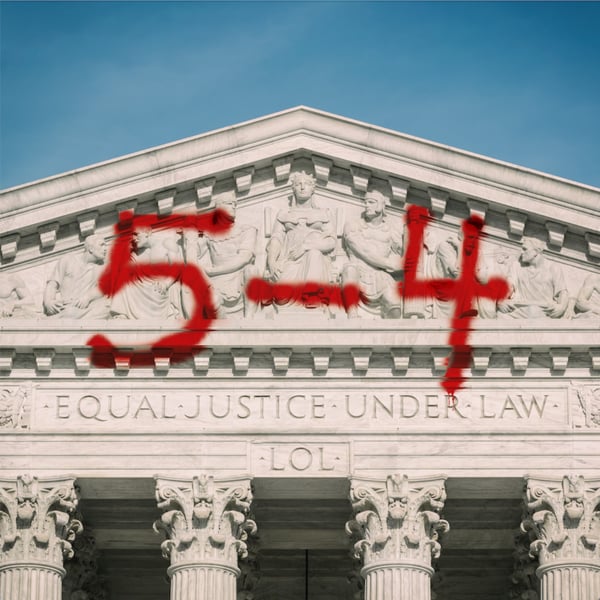Mobile v. Bolden
5-4
Prologue Projects
4.6 • 3.2K Ratings
🗓️ 25 March 2025
⏱️ 50 minutes
🧾️ Download transcript
Summary
While a law may have discriminatory or racist effects—such as diluting the Black vote in a city and rendering those votes essentially meaningless—this does not necessarily mean it was created with malicious intentions. The Supreme Court says that we should assume good faith and not presume that some laws are enacted with racist motives... Sure...
If you're not a 5-4 Premium member, you're not hearing every episode! To hear this and other Premium-only episodes, access to our Slack community, and more, join at fivefourpod.com/support.
5-4 is presented by Prologue Projects. This episode was produced by Dustin DeSoto. Leon Neyfakh provides editorial support. Our researcher is Jonathan DeBruin, and our website was designed by Peter Murphy. Our artwork is by Teddy Blanks at Chips NY, and our theme song is by Spatial Relations.
Follow the show at @fivefourpod on most platforms. On BlueSky, find Peter @notalawyer.bsky.social, Michael @fleerultra.bsky.social, and Rhiannon @aywarhiannon.bsky.social.
Hosted on Acast. See acast.com/privacy for more information.
Transcript
Click on a timestamp to play from that location
| 0:00.0 | Case is submitted. We'll hear arguments next in 1844, City of Mobile against Bolden and the consolidated case. |
| 0:13.3 | Hey, everyone. This is Leon from Prologue Projects. On this episode of 5 to 4, Peter, Riannon, and Michael are talking about Mobile v. Bolden. |
| 0:23.9 | This case, from 1980, is about voting rights. |
| 0:27.8 | Specifically, it's about the difference between merely getting to vote and actually having a say in who gets elected. |
| 0:34.4 | Starting in the Jim Crow era, the city of Mobile, Alabama, used at-large voting to elect their city commissioners, |
| 0:41.2 | a system that ensured that local leaders representing majority-black districts were chosen by the city's white majority. |
| 0:48.1 | A black man by the name of Wiley Bolton, along with other black residents, sued the city of Mobile, |
| 0:53.6 | arguing that at-large voting diluted |
| 0:55.7 | the black votes so much that their votes didn't matter and was therefore in violation of the |
| 1:00.8 | Constitution and the Voting Rights Act. It seemed to me there was a classic case where the city |
| 1:06.1 | had used at-large voting to prevent blacks from being elected. |
| 1:16.4 | But the Supreme Court in the last several years has brought on this business of intent. |
| 1:21.8 | It's almost as though they're saying that if you've been discriminating for a long time, it's okay. |
| 1:25.2 | If you just started recently, it's bad. |
| 1:30.4 | The Supreme Court ruled against the plaintiffs, citing a lack of evidence demonstrating that at-large voting was implemented with the intent of discriminate. |
| 1:34.8 | This is 5 to 4, a podcast dissect and analyze the Supreme Court cases that have caused our civil rights to fall apart like my March madness bracket on day one. |
| 1:58.5 | Already. |
| 1:59.2 | Already. |
| 1:59.6 | Well, that's just a prediction. prediction oh it was like it hasn't even |
| 2:03.9 | started i was like yeah i haven't even filled out my bracket yet has it already started did i miss it |
| 2:08.1 | oh you're because this is going to be out in a week and by then it will have fallen apart i am very |
| 2:15.2 | confident yes that the opening weekend of Madness will be devastating for my |
... |
Please login to see the full transcript.
Disclaimer: The podcast and artwork embedded on this page are from Prologue Projects, and are the property of its owner and not affiliated with or endorsed by Tapesearch.
Generated transcripts are the property of Prologue Projects and are distributed freely under the Fair Use doctrine. Transcripts generated by Tapesearch are not guaranteed to be accurate.
Copyright © Tapesearch 2025.

